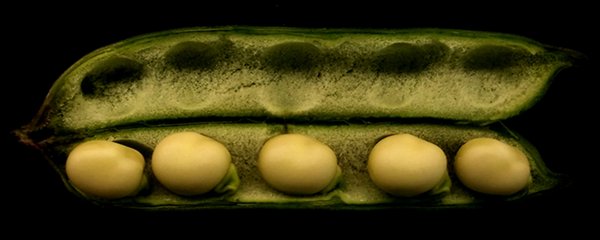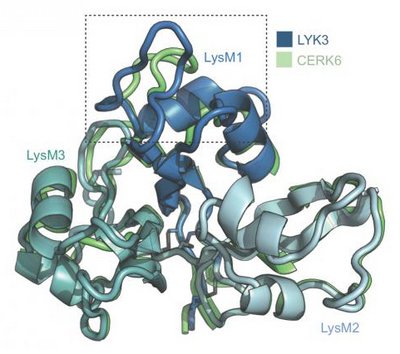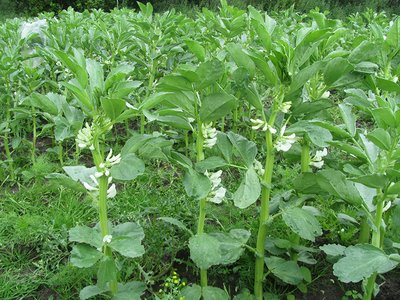Faba bean is a key protein source for tomorrow’s plant-based foods. So far, its extremely large and complex genome has been impossible to characterize, hampering faba bean improvement. Now, researchers have finally decoded the giant faba bean genome.

Faba bean is a key protein source for tomorrow’s plant-based foods. So far, its extremely large and complex genome has been impossible to characterize, hampering faba bean improvement. Now, researchers have finally decoded the giant faba bean genome.

Researchers from Aarhus University have led a team that has discovered one of the ways legume plants balance nitrogen acquisition from the soil with that from their bacterial symbionts. The work identifies regulation of a key plant hormone, cytokinin, as central to this balance. These new results will aid in developing legumes with improved nitrogen fixation and a possible reduction in the use of fertilisers.
Researchers from Aarhus University have led a team that has discovered one of the ways legume plants balance nitrogen acquisition from the soil with that from their bacterial symbionts. The work identifies regulation of a key plant hormone, cytokinin, as central to this balance. These new results will aid in developing legumes with improved nitrogen fixation and a possible reduction in the use of fertilisers.
An international team led by researchers from Aarhus University have discovered how plant receptors recognize specific carbohydrate signaling molecules from their bacterial symbionts. This ability enables the plant to select and accommodate nitrogen-fixing bacteria inside their roots.
![[Translate to English:] gruppefoto](/fileadmin/site_files/mb/nyheder/2021/Forskere_opdager_hvordan_plantereceptorer_verificerer_de_korrekte_symbiotiske_bakterier-674x270_px.jpg)
An international team led by researchers from Aarhus University have discovered how plant receptors recognize specific carbohydrate signaling molecules from their bacterial symbionts. This ability enables the plant to select and accommodate nitrogen-fixing bacteria inside their roots.
![[Translate to English:] gruppefoto](/fileadmin/site_files/mb/nyheder/2021/Forskere_opdager_hvordan_plantereceptorer_verificerer_de_korrekte_symbiotiske_bakterier-674x270_px.jpg)
Legume plants know their friends from their enemies, and now we know how they do it at the molecular level. Plants recognize beneficial microbes and keep harmful ones out, which is important for healthy plants production and global food security. Scientists have now discovered how legumes use small, well-defined motifs in receptor proteins to read molecular signals produced by both pathogenic and symbiotic microbes. These remarkable findings have enabled the researchers to reprogram immune receptors into symbiotic receptors, which is the first milestone for engineering symbiotic nitrogen-fixing symbiosis into cereal crops.
Legume plants know their friends from their enemies, and now we know how they do it at the molecular level. Plants recognize beneficial microbes and keep harmful ones out, which is important for healthy plants production and global food security. Scientists have now discovered how legumes use small, well-defined motifs in receptor proteins to read molecular signals produced by both pathogenic and symbiotic microbes. These remarkable findings have enabled the researchers to reprogram immune receptors into symbiotic receptors, which is the first milestone for engineering symbiotic nitrogen-fixing symbiosis into cereal crops.
A proteomics-based protein-protein interaction study has led to the discovery of proteins that interact with a legume receptor that mediates signal transduction from the plasma membrane to the nucleus. This shows how symbiotic signals from symbiotic bacteria are transmitted upon perception, ultimately leading to their accommodation within the host plant.
A proteomics-based protein-protein interaction study has led to the discovery of proteins that interact with a legume receptor that mediates signal transduction from the plasma membrane to the nucleus. This shows how symbiotic signals from symbiotic bacteria are transmitted upon perception, ultimately leading to their accommodation within the host plant.
Legumes are able to grow in nitrogen-poor soils due to their ability to engage in symbiosis with nitrogen-fixing bacteria. There is a great interest in using the knowledge about this symbiosis, to enable transfer to other non-symbiotic plants. An international research team has come a step further to understanding this complex biological process.
Legumes are able to grow in nitrogen-poor soils due to their ability to engage in symbiosis with nitrogen-fixing bacteria. There is a great interest in using the knowledge about this symbiosis, to enable transfer to other non-symbiotic plants. An international research team has come a step further to understanding this complex biological process.
Garden and potted plants with white spots on their leaves are so popular that they are specially selected for this feature. An international research team has now identified a new mutation in the plant Lotus japonicus which gives leaves with white spots. These results could be important for the improvement of garden and potted plants.
Garden and potted plants with white spots on their leaves are so popular that they are specially selected for this feature. An international research team has now identified a new mutation in the plant Lotus japonicus which gives leaves with white spots. These results could be important for the improvement of garden and potted plants.
An international team of researchers has discovered how legumes are able to tell helpful and harmful invading bacteria apart. The research has implications for improving the understanding of how other plants, animals and humans interact with bacteria in their environment and defend themselves against hostile infections. These findings can have profound implications for both agricultural research and medical science.
An international team of researchers has discovered how legumes are able to tell helpful and harmful invading bacteria apart. The research has implications for improving the understanding of how other plants, animals and humans interact with bacteria in their environment and defend themselves against hostile infections. These findings can have profound implications for both agricultural research and medical science.
In collaboration with national and international experts, researchers from Aarhus University have revealed new fundamental features of biomolecular interactions that enable plants to identify and respond appropriately to microorganisms. The new results provide a better understanding of the mechanisms governing the ability of plants to interact with beneficial microorganisms while being resistant to pathogenic bacteria and fungi. This could have implications for future sustainable agriculture, where useful microorganisms are increasingly sought to replace pesticides.
In collaboration with national and international experts, researchers from Aarhus University have revealed new fundamental features of biomolecular interactions that enable plants to identify and respond appropriately to microorganisms. The new results provide a better understanding of the mechanisms governing the ability of plants to interact with beneficial microorganisms while being resistant to pathogenic bacteria and fungi. This could have implications for future sustainable agriculture, where useful microorganisms are increasingly sought to replace pesticides.
A new discovery of a simpler single-cell infection mechanism may improve our understanding of how legumes control infection by the beneficial bacteria called Rhizobium and how they build root nodules in which the bacteria fix atmospheric nitrogen that can be used by the plants. This discovery may lead to the development of sustainable agriculture with reduced use of artificial fertilisers.
A new discovery of a simpler single-cell infection mechanism may improve our understanding of how legumes control infection by the beneficial bacteria called Rhizobium and how they build root nodules in which the bacteria fix atmospheric nitrogen that can be used by the plants. This discovery may lead to the development of sustainable agriculture with reduced use of artificial fertilisers.

Results published in Science from Aarhus University describe how legumes pick up special signalling molecules to distinguish between harmful and beneficial microbes. These results have been nominated by the Danish technical news journal “Ingeniøren” (the Engineer) as being among the five most important results in Denmark in 2020.

Results published in Science from Aarhus University describe how legumes pick up special signalling molecules to distinguish between harmful and beneficial microbes. These results have been nominated by the Danish technical news journal “Ingeniøren” (the Engineer) as being among the five most important results in Denmark in 2020.
For the second time in his career, Professor Jens Stougaard from the Department of Molecular Biology and Genetics at Aarhus University receives an ERC Advanced Grant from the European Research Council for research in plant molecular biology. The amount awarded is EUR 2.5 million and runs over five years.
For the second time in his career, Professor Jens Stougaard from the Department of Molecular Biology and Genetics at Aarhus University receives an ERC Advanced Grant from the European Research Council for research in plant molecular biology. The amount awarded is EUR 2.5 million and runs over five years.

Faba beans have great potential as a protein crop, and researchers will now optimise the cultivation of beans to replace imported soya bean protein with locally produced faba bean protein for animal feed and food ingredients.

Faba beans have great potential as a protein crop, and researchers will now optimise the cultivation of beans to replace imported soya bean protein with locally produced faba bean protein for animal feed and food ingredients.
Bill Gates recently met with researchers from the Department of Molecular Biology and Genetics at Aarhus University to discuss the sustainable use of biological nitrogen fixation that allows legumes to use atmospheric dinitrogen as a nitrogen source.
Bill Gates recently met with researchers from the Department of Molecular Biology and Genetics at Aarhus University to discuss the sustainable use of biological nitrogen fixation that allows legumes to use atmospheric dinitrogen as a nitrogen source.
Her Majesty the Queen has awarded Professor Jens Stougaard the Order of Dannebrog as of 23 September 2016 in recognition of his impressive career.
Her Majesty the Queen has awarded Professor Jens Stougaard the Order of Dannebrog as of 23 September 2016 in recognition of his impressive career.
Thirty years ago, he left Denmark to do research with the best scientists in his field. Today, research talents from all over the world come to Aarhus to kickstart their careers by working with him.
Thirty years ago, he left Denmark to do research with the best scientists in his field. Today, research talents from all over the world come to Aarhus to kickstart their careers by working with him.
Professor Jens Stougaard receives Denmark's largest individual research award, the 2016 Villum Kann Rasmussen Annual Award for Technical and Scientific Research, valued at DKK 5 million. Candidates do not apply for this award from the VILLUM FOUNDATION.
Professor Jens Stougaard receives Denmark's largest individual research award, the 2016 Villum Kann Rasmussen Annual Award for Technical and Scientific Research, valued at DKK 5 million. Candidates do not apply for this award from the VILLUM FOUNDATION.
Jens Stougaard is the only researcher from a Danish university among the 1% of the most frequently cited researchers in the field of Plant and Animal Science. He is a professor at the Department of Molecular Biology and Genetics, Aarhus University (AU), and is also director of the Centre for Carbohydrate Recognition and Signalling (CARB), a Centre of Excellence supported by the Danish National Research Foundation.
Jens Stougaard is the only researcher from a Danish university among the 1% of the most frequently cited researchers in the field of Plant and Animal Science. He is a professor at the Department of Molecular Biology and Genetics, Aarhus University (AU), and is also director of the Centre for Carbohydrate Recognition and Signalling (CARB), a Centre of Excellence supported by the Danish National Research Foundation.
A new research project financed by the Bill & Melinda Gates Foundation should pave the way towards a cheap and sustainable solution to some of Africa’s food problems. Researchers at Aarhus University are involved in the efforts to develop maize that can create its own fertiliser. On a global scale, this could lead to a reduction in the use of artificial fertilisers and thereby less environmental pollution.
A new research project financed by the Bill & Melinda Gates Foundation should pave the way towards a cheap and sustainable solution to some of Africa’s food problems. Researchers at Aarhus University are involved in the efforts to develop maize that can create its own fertiliser. On a global scale, this could lead to a reduction in the use of artificial fertilisers and thereby less environmental pollution.